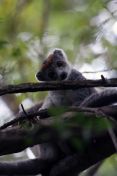Junior Earns National Research Award
There it was, sitting on a tree branch at eye level barely two feet away, “just as curious about what I was doing there, as I was with what she was doing.”
That was Nathanael (Knate) Bartosch’s memorable up-close introduction to a wild crowned lemur in the forests of Madagascar. The junior anthropology major and Honors Program member at Eastern Kentucky University spent 10 weeks this past summer in the island nation off the east coast of Africa documenting the ecology and social behavior of two rare and endangered species of primates, crowned lemurs and Sanford’s lemurs, and their interactions with local farmers.
 Bartosch’s project, titled “Lemurs Living Near Farmers (Year 2): Behavioral Study of Endangered Primates,” so impressed judges that he was recently named one of two winners nationally of the 2017 Award for Academic Achievement Abroad presented by The Forum on Education Abroad. Bartosch, whose experience was funded by the Laura R. Kennamer Endowed Scholarship, is the first college student from a Kentucky institution to earn the award and only the second student from a regional university (as classified by US News & World Report) since the Forum began in 2004 to recognize two students annually.
Bartosch’s project, titled “Lemurs Living Near Farmers (Year 2): Behavioral Study of Endangered Primates,” so impressed judges that he was recently named one of two winners nationally of the 2017 Award for Academic Achievement Abroad presented by The Forum on Education Abroad. Bartosch, whose experience was funded by the Laura R. Kennamer Endowed Scholarship, is the first college student from a Kentucky institution to earn the award and only the second student from a regional university (as classified by US News & World Report) since the Forum began in 2004 to recognize two students annually.
On its website, the Forum said the honor “showcases rigorous and significant undergraduate academics that occur as part of education abroad programs. Academic achievement while abroad represents one of the highest accomplishments of undergraduate student learning. Conducting serious, high-quality academic work while abroad requires critical thinking, analysis and creativity. The international context poses unique challenges and opportunities for understanding of other cultures and societies.”
Bartosch, who graduated from Forest Park High School in Triangle, Virginia, in 2015, had not previously traveled outside the U.S. He said he was “astounded, then honored and excited” to win such a prestigious honor, but his faculty mentor in Madagascar, Dr. Benjamin Freed, wasn’t surprised.
“I have never before had a student gather so much data in such a short time, let alone have a student accomplish so many tasks, seize on so many opportunities, and emerge so well-rounded,” said Freed, who teaches anthropology at Eastern. “He entered the study as an undergraduate, and he emerged a colleague.”
The two camped beside a remote forest in northern Madagascar, conducting dawn-to-dusk observations. “For nearly six weeks, we’d wake up, eat, hike a mile, find our groups, follow our groups until the evening, hike back, wash, eat, write up notes and, finally, sleep in our tents,” Freed noted.
“It was tiring, mentally and physically, yet amazing,” Bartosch added.
Bartosch at times interacted with several students from Canada’s University of Western Ontario and from Madagascar’s University of Antsiranana. He learned Malagasy culture and language from shop owners, local farmers, children, and especially from Louis-Philippe d’Arvisenet, the Malagasy project manager and cultural guide who helped mentor him.
According to Freed, Bartosch’s attempts to learn the native language “endeared him to local people and farmers. He ate Malagasy, learned Malagasy, and lived Malagasy. It is this sort of experience that anthropologists seek. You cannot learn about people’s perspectives unless you live with them day after day.”
Bartosch was able to call upon skills honed in several diverse EKU courses. “I used knowledge from my geology classes to help with landforms, sediments, rock identification, etc.; geography classes for GPS usage and mapping; of course, my anthropology classes; and my English and writing classes to help collect my thoughts and write them down while I was there.” He’ll base his upcoming Honors thesis on his Madagascar experience.
As Freed noted, Bartosch “did cultural anthropology, biological anthropology and even a little linguistic anthropology. Every moment became etched in his mind, and in his journal. He took in every plant, animal and geological formation he could. He took in every star in the night sky. No matter which direction (he) goes, I sense that he now appreciates humans, wildlife and the world around him in ways that not many people experience.”
The EKU team, which also included Katherine Arthur, a 2016 anthropology alumna who helped collect data with Freed in 2016 before the drought, found evidence of changes in the animals’ ecology and social organization and observed how a drought had changed the lemurs’ forest and ecology. “We believe that the presence of local farmers living beside the lemurs’ forest may prevent non-local people from hunting and trapping the lemurs, and may also expand the distribution of the lemurs’ most important food species,” Freed said. “The lemurs may prefer to live near humans.”
Bartosch said the experience provided invaluable insights on the process of data collection in his field. “(It) also helped immensely with my personal confidence. Making my own decisions that’ll affect the outcomes of our journey really instilled a sense of confidence in what I’m doing.”
That confidence will be tested in March 2018, when Bartosch will travel to Boston to present his project at the 14th annual conference of the Forum on Education Abroad, which more than 1,400 international education professionals will attend.
As much as he’s looking forward to that day, his mind can’t help but wonder back to that life-changing moment when he was eye to eye with a lemur.
“We live in a wide, wide world that is full of experiences and people that you can learn so much from,” Bartosch said. “When you leave your comfort zone and what you know, the comparisons you gain are incredible.”
For more information about “incredible” education abroad opportunities through EKU, visit studyabroad.eku.edu.
For more information about the award, visit https://forumea.org/2017/11/13/aaaa-winners-2017.
Published on December 08, 2017
